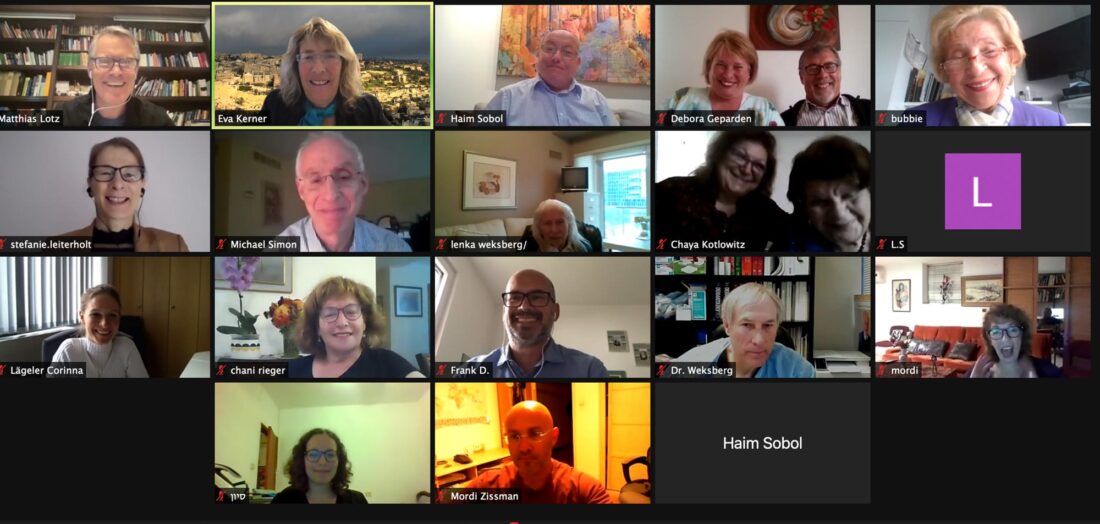Commemoration via Zoom April 2021
In the second year of the Corona pandemic, two survivors, descendants of other survivors, representatives of WMF and the city of Geislingen commemorated the liberation of the victims of the concentration camp in Geislingen on April 29, 1945.
On Thursday, April 29, there was a historical Zoom meeting on the occasion of the anniversary of the liberation of the more than 800 Jewish women and girls who had to perform forced labor at WMF in the concentration camp satellite camp in Geislingen during the Nazi period from 1944 – 1945.
We were very pleased that 2 survivors were actually still present: Lenka Weksberg from Toronto, who had already visited Geislingen in November 2015, and now we could even meet her little sister Rosalie (89), who told us her moving story of being rescued from Auschwitz. In addition, another sister of Lenka, Rose, attended the meeting with her daughter Renee.
Dr Michael Simon, son of Hilda Lustig, from Michigan, USA, (he had written a letter to the people of Geislingen in January, which we had published in the GZ) was also present, as well as the Sobol and Rieger families, descendants of Miryam Sobel, who together had taken part in the silent march and memorial ceremony in Jahnhalle in Geislingen in 2015 shortly before Miryam’s death. Most recently, they were at the inauguration of the memorial on the bike path towards Eybach in Geislingen.
We were also able to welcome the Zissman family, daughter and grandson of Helen Jeckel, as well as Gitta Mann and her daughter. They, too, have already been to Geislingen and last spoke to the students of the Michelberg High School in 2018. The virtual meeting was hosted and organized by the initiative “remembering-honoring-reconciling” represented by Mr. and Mrs. Schneider, Eva Kerner and Matthias Lotz.
The city of Geislingen was represented by Senior Mayor Frank Dehmer. A milestone in coming to terms with the history was certainly also the participation of WMF. For the WMF management Dr. Leiterholt and the head of the communication department Corinna Lägeler were present.
It was a moving moment when Senior Mayor Dehmer opened the meeting with a statement about what remembering, honoring and reconciling means to Geislingen and how important the personal encounters with the survivors and their descendants are to him.
Dr Leiterholt then made a statement on behalf of WMF, in which WMF acknowledged its responsibility in the past and present. The dark history of WMF would always remain a chapter of WMF and should not be explained away. However, today remembering, honoring and reconciling was their goal. Just last week, the lamps in the parking lot in front of the WMF were renewed, so that now a light always shines on the name plaque with all the names of the Jewish forced laborers. They are placed in circles, which also has symbolic meaning.
What was surprising was how much openness and trust the family members shared about their dealings with the persecution of the Jews and how strongly the experiences of their mothers, grandmothers or aunts still shape their everyday lives today in the most diverse ways. For Michael Simon, this meeting was a unique experience that went much deeper than a mere reunion of a graduating class.
The highlight was certainly Rosalie Simon telling about her time in Auschwitz and Geislingen. She was only 12 years old when she came to Auschwitz. Dr. Mengele, the infamous Nazi doctor, sorted the prisoners into two lines. One was selected for work, e.g. to Geislingen, and the other had to go to the gas chamber to be torturously murdered. Her four older sisters were allowed to live and she was to die in the gas chamber. She screamed in despair and her sisters fought for her. They ran and brought her back out of the death line. In the end they succeeded in getting Rosalie on the transport to Geislingen. Her prayers had been answered and now we could even meet her in person.
Malka Zissman emphasized that what was definitely missing in the Holocaust was honor and how now honoring each other helps to create a better world. When she first came to Geislingen in 2015, she didn’t know what to expect, but now she knows what reconciliation feels like.
Eva Kerner, Matthias Lotz




